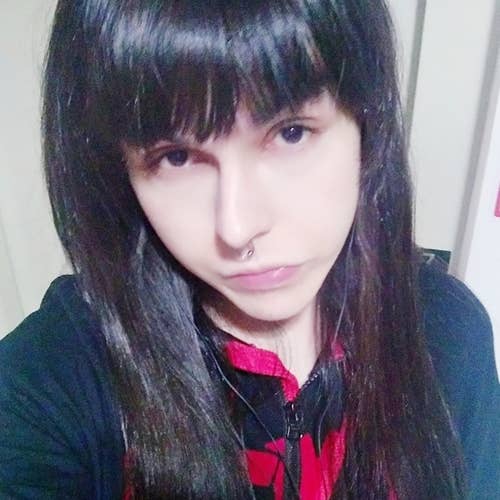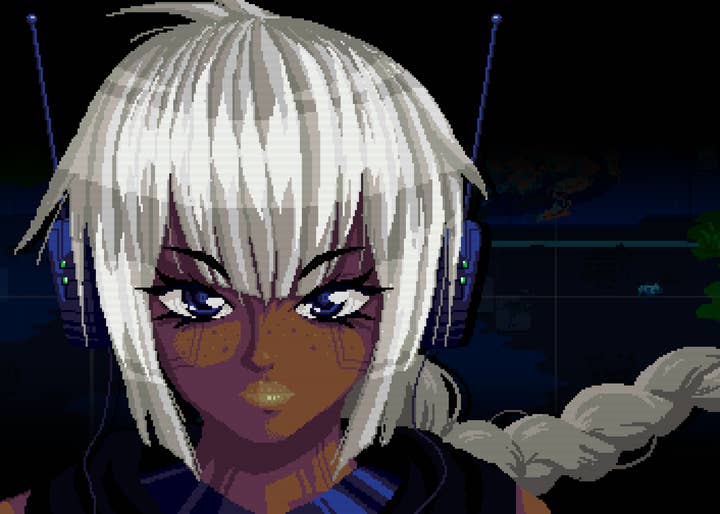Studio Pixel Punk: Getting diversity right means going beyond "good intentions"
At the BIG Festival, the Brazilian indie dev explained the importance of subtlety and "study" in moving past LGBT stereotypes
Improving diversity in games is an increasingly powerful force in the direction of the games industry, but Pixel Punk Studio's Tiani Pixel believes it is easy for developers to simply follow a trend and fall short.
Tiana Pixel was part of a panel at the BIG Festival in Sao Paulo last month, one of a handful of Brazilian developers talking about making games that incorporate social themes and promote inclusion. As a transgender woman, she explained, better representation in games is an important trend - but it's also important that developers make the effort to get the details right.
"It's a trendy subject," she acknowledged. "I want to show how it's important. I want to show how it can impact our lives, and how we can do that in a good way... But also [I want to show] some of the pitfalls when approaching diversity in games... There are problems when approaching transgender and LGBTQ characters in games, and in pop culture as a whole."
"People have good intentions to bring diversity into games, but it's not always successful"
A key example Tiani Pixel referred to in illustrating these pitfalls was a character in Mass Effect: Andromeda, Hainly Abrams. While Bioware obviously had "a good intention" in writing a transgender character for such a popular IP, the execution betrayed a lack of understanding of trans people.
"It is stereotyped," Tiana Pixel said. "People think that everything in her life has to go around the fact that she is transgender. The first moment that you talk to her she tells you her previous name, and she tells you that she's travelling space because she wants to be accepted. Nobody tells you that in the first moment, just when you're getting to know them. But that's what happens in Mass Effect.
"What we see a lot is that people have good intentions to bring diversity into games, but it's not always successful due to a lack of having someone to give consultancy."
Yacht Club Games addressed and corrected a similar misstep in Shovel Knight, which had an overwhelmingly male roster of characters. A subsequent update, called "Body Swap", allowed players to swap bodies, genders and pronouns, and adopt the role of, for example, a female character that identifies as male.

"Those things don't have to work in parallel," Tiani Pixel said of Shovel Knight's Body Swap expansion. "It shows that there is space for diversity - in a way that surprises us, in unexpected ways."
A true paragon of diversity in game content is Toby Fox's Undertale, which was praised for approaching its characters in "a very natural way" - as opposed to Mass Effect's Hainly Abrams, whose entire reason for existing appeared to be to discuss her gender.
"Undertale has a good representation of characters that don't fit the standards that society has of gender," she said. "It has very strong female characters, and LGBT characters. And what's good is that it became a very popular game. It goes against the conservative view that these games cannot make revenue. There are a lot of people waiting for this sort of thing."
Achieving this natural representation of different people and viewpoints isn't easy. "You have to study," she said. "You have to talk to those people to know what's good to do, and what's not good to do." But the importance of doing so, and in doing it in the right way, is that it will create a more inviting and inclusive space for the next generation of players - and, as a result, the next generation of developers.
"It was liberating when I saw that transgender characters should not be just a joke for society; it helped me accept myself"
"I believe representation is very important. When I was a child, all of the characters who were trans that I watched on TV, either they were hypersexualised or they had to be the punchline for a joke. This creates a lot of confusion for those who grow up watching these things. Or regarding any minority, like a black person who only sees black characters just represented in one way.
"It was very liberating for me when I saw that transgender characters should not be just a joke for society; it helped me accept myself. So we should think about the way we generate content, and how we can show people that it's worthwhile being who you are; that they can live in that way in this society, and be fulfilled in the way they are."
Indeed, this is the approach that Tiani Pixel is taking in her own game, Unsighted, which is being made in collaboration with Fernanda Dias under the name Studio Pixel Punk. When I met with Tiani and Fernanda at the BIG Festival, Tiani explained that many people assume Unsighted would be entirely about their personal experiences, but while that does inform the voice of the game, it is "not totally" about LGBT issues.
"I'm not thinking about it 24 hours a day," Tiani said. "The game does not approach it directly, but subtly."

Tiani's work on Unsighted's art and coding, and Fernanda's contributions to its audio and music, is already winning praise - not least in the form of a nomination for the BIg Festival's coveted Best Game award, alongside the likes of 11 bit Studios' Frostpunk and Weather Factory's Cultist Simulator. For Fernanda, this is the first time she has worked on a game; for Tiani, this is the realisation of an ambition to work independently.
"I've worked in the industry before this, but always with others," Tiani explained. "I'd never done something indie like this. I got all the experience I had and decided to make my a game, with all of the things I really want to have in a game."
"We want to make characters for people who don't always feel connected to games on a personal level"
After seeing Unsighted, it's clear that the vision is as embedded in a lifetime of playing and enjoying video games as issues around representation and diversity. The game's post-apocalyptic cyberpunk setting both well realised and redolent of a number of classic titles. During our conversation, the words Zelda and Metroid crop up over and again, as does the unforgiving, die-and-learn structure of Dark Souls.
But the push towards inclusivity is there in the key details, the characters and the conversations. If Unsighted calls to mind any of the games Tiani mentioned in the talk a day earlier, it's probably the unassumingly subversive Undertale.
"It's a lot of mixed influences," Tiani said. "But the main character is a woman, and not a white woman. We always try when working on character designs to make something out of the obvious. In this kind of game you always have a male character... But we want to make characters for people who don't always feel connected to games on a personal level. They can find that here.
"We have more complex points involving LGBT characters and women, while having a kind of game that usually doesn't have those characters."
In that respect, Unsighted is more potential than reality. The version available at the BIG Festival is just a slice of what Studio Pixel Punk has planned, and the majority of what it will add is where those subtle, natural expressions of diversity will be found.
"There are two people who said they were inspired by me posting the game around. It's like the mission is already accomplished"
"The thing that's missing is mostly content," Fernanda said. "The systems are in place already... Having a game that is different in any way is good. And it's a difference that we really care about, so we try to go in that direction.
"Seeing those kinds of characters, especially for us women, is very important, because it's not usual. We're trying to bring this to the games. It's not quite there yet, but we're trying."
Studio Pixel Punk is now courting a number of publishers about cutting a deal for Unsighted, which would allow them to develop those aspects of the experience even further. For now, though, both Tiani and Fernanda already feel that they've gone beyond good intentions, and are making a difference in Brazil's growing developer community.
"Definitely," Tiani said. "We have a lot of game ideas. There's much more to come. With each year more and more women and minorities are getting involved in the games industry... Not only represented in games, but also developing games.
"It's already happening, actually. There are two people who said they were inspired by me posting the game around. That's really cool. It's like the mission is already accomplished."
"If we reach even two people," Fernanda added, "it's already good."








